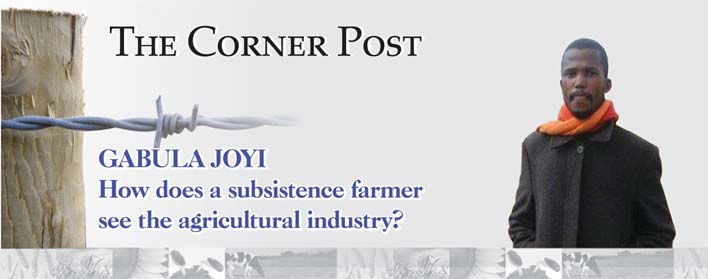November 2016

According to leadership and management specialist, Simon Sinek, working hard for something we don’t care about is called stress, while working hard for something we love is called passion. Gabula Joyi is a subsistence farmer in Mputi in the Mthatha district in the Eastern Cape who works hard because he loves what he does. On his 25 hectares of land this passionate farmer cultivates maize and cabbages and also owns some cattle and sheep. And although hard work does not necessarily guarantee success, he realises that without hard work no success is possible.
To Gabula the agricultural industry consists of a variety of subdivisions, namely production, marketing, financial resources, land and land access, bank loans for production and all the various agricultural products and their representatives. As a subsistence farmer he feels that this industry has room to develop and grow. ‘Subsistence and smallholder farmers play a key role towards food security at household level,’ he says.
According to him the industry provides various channels for smallholder and subsistence farming; however these opportunities are unfortunately not that accessible to subsistence farmers. The entire agricultural industry is important to all South Africans and therefore needs to be supported accordingly by the various stakeholders to ensure that this industry is sustained. He further feels that what is important to this industry is the continuous assistance of smallholder and subsistence farmers through financial aid and skill development.
‘This will enable us to play a bigger and better role with regards to food security at household levels with smaller incomes,’ he explains. ‘The access of productive land, the empowering of young up and coming farmers so that this sector survives and is sustained is also crucial for this sector’ he continues his viewpoint.
He sees his role in the agricultural industry as small, but significant. ‘I am the farmer who produces food for my household primarily although a lot of my surplus is purchased by the local community members and interested hawkers and shops,’ he explains. This makes him feel part of the industry because he knows if he is taking care of his role within his space, he is ensuring that household food security is achieved and that those who are in need of whatever food source he produces, can also access it. ‘Even though my role is a lot smaller than the big commercial farmers, I feel I make a big enough impact to be known as key role-player in this industry within my community,’ he adds proudly.
To him the one area within the agricultural industry that requires a different approach is in supporting small-scale farmers. Access to land and ownership thereof is paramount to these farmers. The need to access financial institutions will position the farmers to grow and develop the vast amount of hectares which lay fallow in this region of OR Tambo in the Eastern Cape. Skills development and access to relevant information is also crucial towards ensuring that small-scale farmers develop into productive farmers in the communal areas.
According to Gabula subsistence farmers need access to the following:
‘Currently Grain SA is the only hope of any up to standard assistance I am receiving,’ he says and adds, ‘The government is battling and cannot sustain their way of supporting farmers.’
His dream for his own farming operation is to become a successful farmer with all the necessary knowledge, skill and finances to sustain his production systems. In the broader agricultural sector he hopes to see a common understanding that farmers need to be subsidised, given the necessary skills and support that will allow them to thrive and become independent in the future.
When a hardworking person saw the well known phrase, ‘Good things come to those who wait’ on a billboard, he decided to change it to be a better reflection of the truth. It read, ‘Good things come to those who work their fingers to the bone and never give up.’ Whatever obstacle you face as a subsistence farmer, keep on working passionately and good things will come.
A special word of thanks to Sinelizwi Fakade, Grain SA Provincial co-ordinator in Mthatha, Eastern Cape, for his support to subsistence farmers in the area as well as his assistance in acquiring the requested information from Gabula Joyi for this article.
This month's edition of The Corner Post was written by Louise Kunz, Pula Imvula contributor.
For more information, send an email to louise@infoworks.biz.
Publication: November 2016
Section: Pula/Imvula